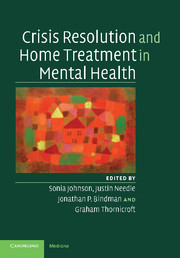Book contents
- Frontmatter
- Contents
- List of contributors
- Foreword
- Acknowledgements
- Section 1 Introduction and concepts
- Section 2 The evidence
- Section 3 Current practice
- 6 Crisis resolution teams: rationale and core model
- 7 The crisis resolution team within the community service system
- 8 Assessment of crises
- 9 Assessment and management of risk
- 10 Symptom management
- 11 Practical psychosocial interventions
- 12 Working with families and social networks
- 13 Strategies for promoting engagement and treatment adherence
- 14 Mixed blessings: service user experience of crisis teams
- 15 Early discharge and joint working between crisis teams and hospital services
- 16 Working with repeat users of crisis resolution services
- 17 Responding to diversity in home treatment
- 18 Coercion and compulsion in crisis resolution teams
- Section 4 Variations and enhancements
- Section 5 Developing a local service
- Index
11 - Practical psychosocial interventions
from Section 3 - Current practice
Published online by Cambridge University Press: 13 August 2009
- Frontmatter
- Contents
- List of contributors
- Foreword
- Acknowledgements
- Section 1 Introduction and concepts
- Section 2 The evidence
- Section 3 Current practice
- 6 Crisis resolution teams: rationale and core model
- 7 The crisis resolution team within the community service system
- 8 Assessment of crises
- 9 Assessment and management of risk
- 10 Symptom management
- 11 Practical psychosocial interventions
- 12 Working with families and social networks
- 13 Strategies for promoting engagement and treatment adherence
- 14 Mixed blessings: service user experience of crisis teams
- 15 Early discharge and joint working between crisis teams and hospital services
- 16 Working with repeat users of crisis resolution services
- 17 Responding to diversity in home treatment
- 18 Coercion and compulsion in crisis resolution teams
- Section 4 Variations and enhancements
- Section 5 Developing a local service
- Index
Summary
All crises encountered by crisis resolution teams (CRTs) arise in a social context. In most, problems in the social environment have a direct role in precipitating the crisis, and even in those where the connections between psychopathology and environment are not obvious, therapeutic work must still be delivered in a way that is appropriate to the social context. This chapter describes practical interventions to address the psychosocial problems that trigger, exacerbate and arise from crises. It begins by considering how assessment must lead to an understanding of a person's social environment. The specific areas in which CRTs find themselves attempting to intervene with individuals are then considered in more detail (work with families and social networks is discussed in Chapter 12).
Who should provide psychosocial interventions?
Psychosocial interventions have traditionally been divided between the various professional disciplines involved in mental health: housing problems are seen as the province of the social worker; difficulties with cleaning, shopping and cooking are assessed by occupational therapists, and perhaps addressed by support workers; while nurses and doctors attempt to demarcate ‘clinical’ from ‘social’ problems. A CRT is unlikely to be able to maintain these traditional boundaries to the same extent as generic community mental health teams. The acute nature of the work and the necessity for each shift to be able to take on and deal with a full range of problems requires that all members of the team, even doctors (who are often the most resistant to multidisciplinary working), should develop a range of skills and be willing to make the attempt to step out of narrow professional roles in order to solve a problem.
- Type
- Chapter
- Information
- Crisis Resolution and Home Treatment in Mental Health , pp. 137 - 150Publisher: Cambridge University PressPrint publication year: 2008
- 1
- Cited by



